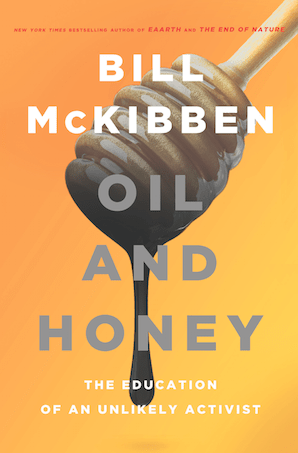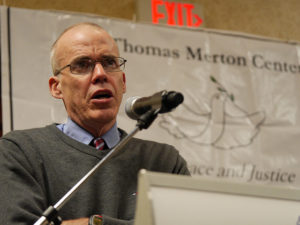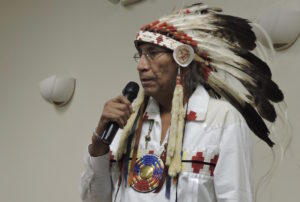|
To see long excerpts from “Oil and Honey” at Google Books, click here.
|
“Oil and Honey: The Education of an Unlikely Activist”
A book by Bill McKibben
By Curtis Brainard
The documentary “An Inconvenient Truth” may have secured global warming’s place in American consciousness and pop culture — a laudable accomplishment, to be sure — but Al Gore didn’t inspire the type of grass-roots movement that could stand up to politicians and institutions to rein in the oil and gas industry. That task fell to Bill McKibben, a journalist and writer who, in the past two years, has spearheaded campaigns that stymied approval of the Keystone XL pipeline — a focal point of battles over climate and energy policy — and persuaded dozens of cities, universities and religious institutions to think about ditching their investments in fossil-fuel companies.
“I didn’t particularly want to lead a movement, but I wanted to join one, and so I helped to build it,” McKibben writes in his memoir, “Oil and Honey,” an endearing account of his reluctant rise to leadership. The book weaves together his life on the road stirring up opposition to corporate excess and his life at home trying to build a sustainable world, one local farm at a time.
McKibben would’ve preferred to spend a lot more time in Vermont, hiking the mountains outside his house and helping his friend Kirk Webster, whose apiary he’d financed, tend to his beehives. But a sense of responsibility pulled him away. He had already written many books and articles on the ways humans screw up the Earth, but in the past decade, he came to the conclusion that it wasn’t enough. In the face of planetary abuses such as climate change, he needed to do more, so he began agitating and organized his first protest in 2006.
McKibben quickly proved to be a nimble organizer. Working with a group of students at Middlebury College, where he taught, he launched 350.org, which coordinated 5,200 climate-change rallies in 181 countries in the fall of 2009. The group led a similar day of action the following year. It was the “first big green movement for the Internet age,” as he proudly describes it, and an intentional change of tactics from the “Beltway operations” of the country’s major environmental groups, which “were better suited for the 1970s, when they could lobby Congress with some hope of victory.”
While keeping his ire focused on the oil and gas industry and politicians, McKibben doesn’t hide his frustration with environmental groups’ lack of grass-roots organizing, arguing at one point that their supporters are better at “writing checks” than protesting. But he’s also honest about his own shortcomings in the field.
Despite two worldwide climate rallies, the Obama administration was poised by the summer of 2011 to approve the Keystone XL pipeline, and McKibben recognized the need for special measures. “We’d need to go to jail,” he realized, so he sat down to write a letter to 350.org’s friends and supporters, urging them to join him in a march on the White House that would probably get them arrested for trespassing. After he finished, his hand hovered above the send button — he knew he was about to cross a line. “To this point I’d been able to pretend that I was mostly a writer who happened to be helping with some activism,” he writes. Now he was an unabashed activist.
Over two weeks, the police arrested 1,253 Keystone XL opponents outside the White House, making it “the biggest civil disobedience action since the protests against nuclear testing in the 1980s,” McKibben writes. The nights he spent in jail made him feel like he “was finally taking action on a scale that began to match the scale of the problem.” But the arrests got scant notice from the White House, and he promised to keep the pressure on. Just over two months later, he followed through by organizing a human ring that encircled the White House, and soon after, the administration postponed the decision on Keystone XL.
McKibben’s descriptions of his civil disobedience in Washington are positively gleeful, but the charm of activism (at least the kind that keeps you constantly moving) quickly wore off. Less than a year after his pipeline victory, he organized another day of worldwide climate rallies, and shortly thereafter he launched a campaign urging local governments, universities and other institutions to shed their investments in fossil-fuel companies. Each of these efforts involved weeks to months of crisscrossing the country to drum up grass-roots support and participation, and for McKibben, the challenge became as much about psyching himself up as psyching up the crowd. “The trick is to say something for the hundredth time and have it sound fresh, to mean it as you say it,” he writes, and he often went to bed at night yearning for home.“Oil and Honey” is as much about McKibben’s life in Vermont as it about his life on the road, and he interlaces the tale of his activism with the tale of his friendship, and eventual business partnership, with Webster, a beekeeper he’d met in 2001 when he invited him to speak to a class on local food production at Middlebury. McKibben admired Webster, who’d survived threats to his business through clever adaptation. Instead of using chemicals, he developed innovative breeding techniques that fostered pest-tolerant bees; and instead of taking on massive loans, he lived within his means, settling for meager to modest profits. Webster’s apiary was the antithesis of giant agribusinesses “powered by fossil fuel,” and it inspired in McKibben a vision of “producing a nation of careful, small-scale farmers … who can adapt to the crazed new world with care and grace, and who don’t do much more damage in the process.”
But McKibben admits that in his case the appeal of the apiary was “not just or even mainly intellectual.” Acknowledging that it’s not for everybody (he mentions more than once that Webster was never able to find a wife), he extols the virtues of a quiet existence that’s more in sync with the cycles of the natural world than with the rhythm of email and politics.
There are a lot of bee analogies in “Oil and Honey.” There are the expected ones about the “pollination” of a movement and the promotion of durability through “squat, hardy colonies,” but the most interesting one is darker and more complicated. Likening fossil-fuel companies to bees, McKibben observes that they are able to “gather resources from great distances, carry them exactly where they’re needed, and combine various skills to produce something of great value from crude raw materials.” But fossil-fuel companies and bees are also “simple,” McKibben argues, in the sense that they are “single-minded” about production — it’s what they do, and the more the better.
“If you want honey, you need a hive of bees,” he writes. “But if you were trying to decide if making honey was a good idea, bees would be the last creatures to ask. You know what their answer is going to be. In fact, if you get in their way they’ll be a little perplexed for a while. … And if you persist in getting in their way, they’re eventually going to get mad and sting. That’s just how it works.”
So it is with fossil-fuel companies, McKibben has learned, conceding, somewhere along the line in his engaging memoir, that he’s actually afraid of bees. Thankfully, though, he is not afraid of fossil-fuel companies, and he is not asking them whether they think more oil production is a good idea. He’s asking the public.
McKibben insists again and again that he “wasn’t cut out to be a leader,” but his story of how he reluctantly became one seems genuine, revealing the difficult choices and sacrifices that he made on the road from writer to activist. Neither an acerbic screed against modern industry nor a naive vision of some bucolic utopia, his book is simply an enjoyable tale of one man’s decision to fight for a world with less oil and more honey.
Curtis Brainard is a freelance reporter and a contributing editor at Columbia Journalism Review.
©2013, Washington Post Book World Service/Washington Post Writers Group







You need to be a supporter to comment.
There are currently no responses to this article.
Be the first to respond.